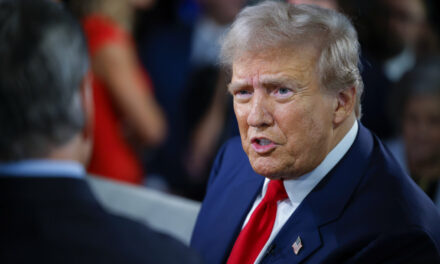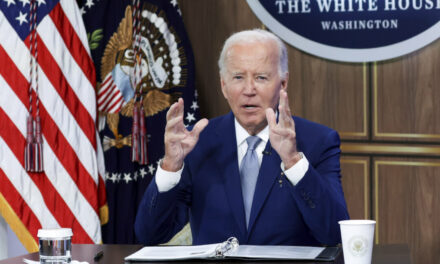We support our Publishers and Content Creators. You can view this story on their website by CLICKING HERE.
The Chinese Communist Party is ‘using every means to infiltrate our institutions and really disrupt our way of life,’ Rep. John Moolenaar (R-Mich.) said.
WASHINGTON—Communist China has gained “back-door access” to U.S. technologies through partnerships between academic research institutions over the past decade, with millions of dollars in U.S. funding indirectly going to advance Chinese military technology, according to a new congressional report.
The report, a collaboration between Republicans on the House Select Committee on the Chinese Communist Party and the House Education and Workforce Committee, found that U.S.-funded researchers have collaborated with their Chinese counterparts in fields such as hypersonics, directed energy, nuclear and high energy physics, and artificial intelligence and autonomy.
“The Chinese Communist Party is driving its military advancements through U.S. taxpayer-funded research and through joint U.S.-PRC institutes in China,” Moolenaar said, referring to communist China’s official name, the People’s Republic of China.
The report identified more than 8,800 publications supported by Department of Defense (DOD) funding and published with Chinese co-authors, and an additional 185 publications supported by funding from U.S. intelligence agencies. More than 2,000 DOD-funded papers included co-authors who were directly affiliated with China’s defense research and industrial base.
These collaborations are “providing back-door access to the very foreign adversary nation whose aggression these capabilities are necessary to protect against,” according to the report.
“The troubling conclusion then is that DOD-funded research—intended to allow the U.S. military to maintain a technological edge over its adversaries—has likely been used to enable and strengthen the PLA,” the report states.
Case Studies
The report features six case studies in which federally funded researchers helped the Chinese Communist Party (CCP) achieve advancements in fourth-generation nuclear weapons technology, artificial intelligence, advanced lasers, nanotechnology, graphene semiconductors, and robotics.
One case involved an unnamed researcher—referred to as “Researcher 4”—who the report says “is a pioneer in piezotronics and nanogenerators” and secured about $22 million in federal funding from several U.S. agencies, including the Department of Energy, NASA, and the U.S. Air Force, over decades.
The researcher has also participated in the CCP’s talent programs since 1992 while holding numerous positions within “problematic Chinese institutions” such as the state-owned Chinese Academy of Sciences, according to the report.
Between 2012 and 2024, the researcher filed hundreds of patents in China.
“Many patents appear to directly leverage concepts developed during Researcher 4’s U.S. tenure, suggesting the transfer to the PRC of expertise and applied capability likely funded by American taxpayers,” the report reads.
In 2014, the researcher accepted an award in a ceremony attended by CCP leader Xi Jinping and representatives from China’s top military body, the Central Military Commission. The ceremony praised the researcher for building “cutting-edge scientific research centers and platforms bases in China,” according to the report.
“If [China] has an opportunity to take advantage of U.S. taxpayer dollars, it’s certainly going to do that.
“Our taxpayer dollars should be used in our country to advance our systems and not to help the communist Chinese advance their system.”
Joint Institutes
The report also examined what it describes as problematic joint institutes between U.S. and Chinese universities, arguing that these partnerships “conceal a sophisticated system for transferring critical U.S. technologies and expertise to the PRC.”
Through those institutes, American academics, including those who received federal funding, have traveled to China to work with and advise Chinese scholars and train Chinese students, according to the report.
“This creates a direct pipeline for the transfer of the benefit of their research expertise to the PRC,” it reads.
The report looked at three joint institutes: Tsinghua-Berkeley Shenzhen Institute (TBSI), Georgia Tech Shenzhen Institute (GTSI), and Sichuan University-Pittsburgh Institute.
“I want to point out both of those institutions since this report came to light, and since they worked with our committee on these findings, they recognized the problem with these affiliations and have broken off those affiliations,” Moolenaar said.
Georgia Tech said in a statement that the report’s claims are “unsubstantiated.”
“There was no research conducted at GTSI, no facilitation of technology transfer, and no federal funding provided to China,” the university said in a statement.
Berkeley’s researchers “engage only in research whose results are always openly disseminated around the world,” and the university was “not aware of any research by Berkeley faculty at TBSI conducted for any other purpose,” Katherine Yelick, the university’s vice chancellor for research, said in a statement.
Yelick said the university has also decided “to start the process of relinquishing all ownership” in the Shenzhen school “after careful consideration, which began several months ago.”
She added that Berkeley “takes concerns about research security very seriously—including those concerns voiced by Congress.”
The University of Pittsburgh said it could not comment because the school “was not consulted and did not work with the House Select Committee throughout the investigation.”
Guardrails
Moolenaar said at the event that the report does not explicitly say that any laws have been broken.
“It is not illegal for a professor at a university to collaborate with the People’s Liberation Army, which is shocking when you think of them,” he said.
“So what we are advocating is really tightening the guardrails in terms of what is legal, what is not, what taxpayer dollars, especially defense dollars, can be used for, in terms of the types of partnerships and educational arrangements.”
Gabriel Scheinmann, executive director of the Alexander Hamilton Society, told The Epoch Times that the United States needs to fix the problem.
“American universities collaborating with Chinese universities on research projects that have military implications—none of it [is] actually illegal. I think the onus is actually on us, on the United States, on Congress, on the universities, to actually get their house in order,” Scheinmann said.
“It’s nice to see Congress start to wake up and pay more attention to it, but obviously, they got a long way to go to actually solving the problem.”
Another recommendation is that Congress should ban researchers receiving federal funds from engaging in collaboration with “highest risk entities,” such as entities affiliated with the PLA, the Seven Sons of National Defense, China’s national defense labs, and China’s Ministry of Public Security.
Congress should also ban federally funded researchers from “any future collaboration” with these entities related to the subject matter of their research grants, according to the report.
“We know that the Chinese Communist Party is becoming more aggressive at home and around the world, and is using every means to infiltrate our institutions and really disrupt our way of life,” Moolenaar said.
The Associated Press contributed to this report.

 Conservative
Conservative  Search
Search Trending
Trending Current News
Current News 







